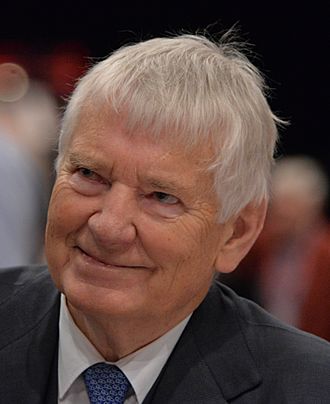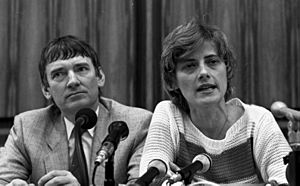Otto Schily facts for kids
Quick facts for kids
Otto Schily
|
|
|---|---|

Schily in 2015
|
|
| Minister of the Interior | |
| In office 27 October 1998 – 22 November 2005 |
|
| Chancellor | Gerhard Schröder |
| Preceded by | Manfred Kanther |
| Succeeded by | Wolfgang Schäuble |
| Leader of The Greens in the Bundestag | |
| In office 29 March 1983 – 3 April 1984 Serving with Marieluise Beck and Petra Kelly
|
|
| Chief Whip | Joschka Fischer |
| Preceded by | Office established |
| Succeeded by | Antje Vollmer |
| Member of the Bundestag for Bavaria |
|
| In office 2 December 1990 – 27 September 2009 |
|
| Constituency | Social Democratic Party List |
| Member of the Bundestag for North Rhine-Westphalia |
|
| In office 25 January 1987 – 7 November 1989 |
|
| Preceded by | The Greens List |
| In office 6 March 1983 – 13 March 1986 |
|
| Constituency | The Greens List |
| Personal details | |
| Born |
Otto Georg Schily
20 July 1932 Bochum, Weimar Republic (now Germany) |
| Political party | Social Democratic Party (1989–present) The Greens (1980–1989) |
| Alma mater | Ludwig Maximilian University of Munich University of Hamburg Free University of Berlin |
Otto Georg Schily (born 20 July 1932) is a German politician. He served as the Minister of the Interior for Germany from 1998 to 2005. He was part of the government led by Gerhard Schröder, who was the Chancellor at the time.
Schily is a member of the Social Democratic Party of Germany (SPD). He was also one of the people who helped start the Green Party in West Germany.
Contents
Early Life and Education
Otto Schily was born in Bochum, Germany, on July 20, 1932. His father was a director at an iron works. Otto grew up in a family that followed anthroposophy, a special way of looking at the world. His younger brother, Konrad Schily, also became a politician and an academic.
During World War II, Otto and his family lived in Bavaria. His family did not support Adolf Hitler and his government.
In 1962, after studying law and politics, Otto Schily became a lawyer. He studied at universities in Munich, Hamburg, and Berlin. A year later, he opened his own law office.
In the 1970s, he became well-known as a lawyer. He defended people who were part of a left-wing group. He was known for following his own strong beliefs.
Political Journey
Starting the Green Party

In 1980, Otto Schily helped create the Green Party. This party focused on environmental protection and peace.
In 1983, Schily was elected to the Bundestag, which is the German parliament. The Greens were in parliament for the first time. He became one of the main spokespersons for the Green Party's group in parliament. He worked alongside Petra Kelly and Marieluise Beck.
In parliament, he was a leader of the "realist" group within the Greens. This group believed in working with other larger parties, like the Social Democrats, to form a government. He had to leave parliament for a short time in 1986 due to the party's rule about rotating members. However, he was re-elected in 1987.
Joining the Social Democrats
Over time, Schily felt less connected to some of the Green Party's strict ideas. In 1989, he left the Green Party and joined the Social Democrats (SPD). He then represented the SPD in the Bundestag starting in 1990.
In the years that followed, he worked on issues related to the former East Germany. He also helped coordinate legal policies for the SPD. From 1994 to 1998, Schily was part of a committee that chose judges for Germany's highest courts.
Minister of the Interior (1998–2005)
When Gerhard Schröder became Chancellor in 1998, he chose Otto Schily to be the Federal Minister of the Interior. This is a very important job, dealing with national security and public safety. Schily was the oldest member of the government at that time.
During his time as minister, Schily made some decisions that were seen as quite strict. After the events of September 11, 2001, he helped create new anti-terrorism laws in Germany. His ministry took action against certain groups, banning them and carrying out investigations.
He also worked on a law that made it easier for skilled workers to come to Germany. At the same time, this law made controls on foreign militants tougher. In 2004, he suggested creating special camps to help manage people trying to immigrate to the European Union.
In 2005, Schily faced criticism for allowing a search of a news magazine's office. This happened after the magazine published information from a secret police report.
After the 2005 elections, a new government was formed under Angela Merkel. Wolfgang Schäuble took over as Minister of the Interior. Otto Schily remained a member of parliament until 2009. He also served on the Committee on Foreign Affairs.
Life After Politics
After his time as a minister, Otto Schily joined the supervisory boards of companies that work with biometric technologies. These technologies use things like fingerprints or facial scans for identification. This led to some discussions about whether he was using his past government experience for personal gain.
From 2006 to 2007, Schily was part of a group of European politicians. They worked on rewriting an important European agreement, which later became known as the Treaty of Lisbon.
Schily has also held various other positions, both paid and unpaid. These include:
- Member of the Advisory Board for Deloitte Germany.
- Member of the Advisory Board for the Schengen White List Project.
- Member of the Board of Trustees for the Hertha BSC Foundation.
- Member of the European Advisory Board for Investcorp (since 2006).
- Member of the Advisory Board for Ziegert Bank- und Immobilienconsulting.
- Member of the Advisory Board for DAPD News Agency (2011-2012).
- Member of the Supervisory Board for the 2006 FIFA World Cup Organizing Committee (2005-2006).
Achievements and Recognition
In 2005, Otto Schily received the Leo Baeck Medal. This award recognized his work in promoting tolerance and fairness in society.
See also
 In Spanish: Otto Schily para niños
In Spanish: Otto Schily para niños
- Politics of Germany
- Order of the Oak Crown
 | Georgia Louise Harris Brown |
 | Julian Abele |
 | Norma Merrick Sklarek |
 | William Sidney Pittman |

